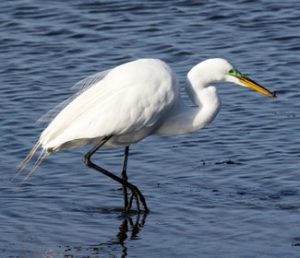Composting your kitchen and yard waste can make a huge difference in the Barnegat Bay (leaves and grass clippings that make their way to the Bay result in phosphorous pollution) and in your own lawn and garden. Homemade compost can provide enrichment for your soils, and protection for your plants, trees, and shrubs. Composting also reduces soil diseases, protects plant roots from wind and sun damage, keeps the weeds under control, and conserves water which will always be a critical issue for New Jersey. And it’s all free!
A compost pile can be built in a beautiful $100 bin from your favorite garden store, or it can be built for no cost with a circle of chicken wire wrapped around a couple of poles. For inspiration and instructions on how to build your own compost bin, check out these 23 DIY composter bin ideas.
Compost needs greens (nitrogen), in the form of fresh grass clippings, weeds, kitchen scraps, and browns (carbon), in the form of dead leaves, small twigs, wood chips, and shredded newspaper. Try to provide a little of both and mix it all up with your kitchen scraps, lint from the dryer, small pieces of cloth, torn up pieces of cardboard from your paper towel roll, dead house plants — you name it.
Some things you want to keep out of your compost bin are invasive weeds, pet waste,* dairy products, meat, bones, and basically anything that’s been cooked. These things will just attract the wrong kinds of critters to your pile and may result in some nasty smells.
*PLEASE NOTE that manure from cows, sheep, chickens and rabbits are a valuable source of nitrogen because the animals are vegetarians. Manure from human, cat, and dog waste carries disease pathogens and should never be composted. Please flush your pet waste down the toilet (ideally) or dispose of it by wrapping it in a bag and placing in your garbage can. Yes, this is irritating, but if the waste is not disposed of properly, it will make its way into the BARNEGAT BAY and you and your children will be swimming with it next summer.
Turn your compost pile occasionally (the more you turn it, the quicker it breaks down) and keep it relatively moist.
Remember to stockpile your compost materials so that you’ll have available greens and browns for a good mix in your bin. Often people have a hard time composting all of their fall leaves so just bag them and stick them behind the garage for that mid-summer day when the compost bin is overly full of fresh grass clippings (and vice-versa).
Don’t give your holiday tree away! Cut the branches off and arrange them underneath shrubs and in areas of your garden which you would like to have a little more protection from the winter weather. Use the remaining tree trunk for a home-made arbor or tomato support next summer. All your decorating greens can get a little more life out of them by using them for a winter mulch. Chop them up further in the spring and add them to your compost bin.
Additional websites to help answer your questions about composting are:
Become a Master Composter through the Ocean County Master Composters Training Program!
The Ocean County Master Composter Training Program is offered once annually, subject to demand, in the fall of each year to train a knowledgeable core of citizens who can provide the residents of Ocean County with information on how they can manage the organic portion of their solid waste. The training is held at the Ocean County Recycling Education Center, located at the County’s Northern Recycling Center.The program is provided free of charge to Ocean County residents and taxpayers. The non-resident fee is $75.00 per person. Contact Sandra Blain-Snow for more information.

